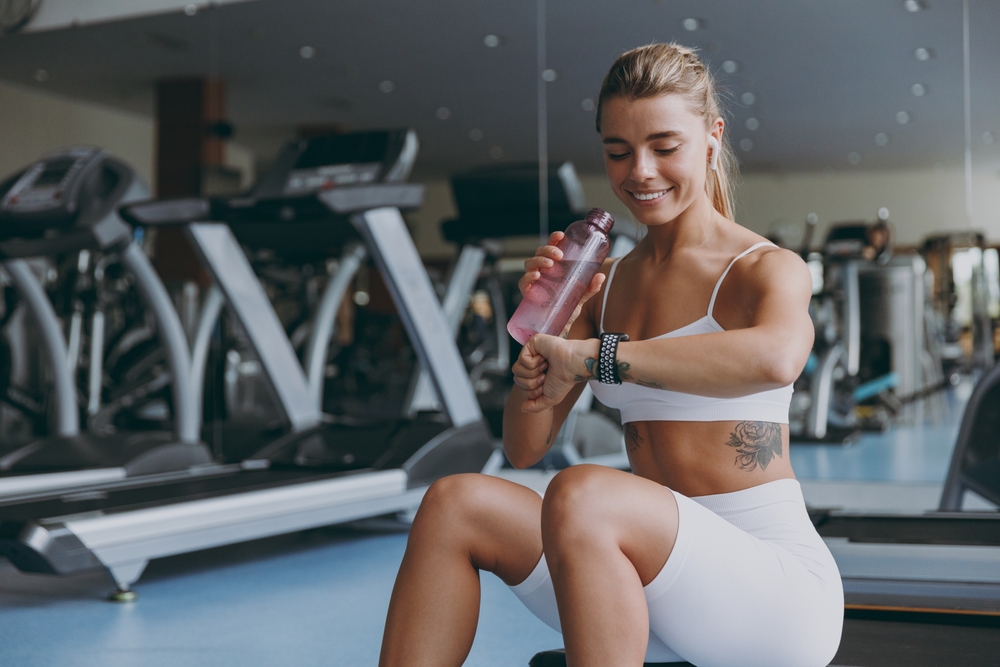Whether you’re a serious athlete or exercise for recreation, it’s important to stay hydrated. Good hydration means getting the right amount of water before, during, and after exercise. Water regulates your body temperature and lubricates your joints. It helps transport nutrients to give you energy and keep you healthy. If you’re not hydrated, your body can’t perform at its highest level. You may feel tired, have muscle cramps, dizziness, or other serious symptoms.
Path to improved health
A simple way to make sure you’re staying properly hydrated is to check your urine. If your urine is usually colourless or light yellow, you are most likely well hydrated. Dark yellow or amber-coloured urine can be a sign of dehydration.
How much water should I drink while exercising?
There are no exact rules for how much water to drink while exercising, because everyone is different. You need to consider factors including your sweat rate, the heat and humidity in your environment, your clothing, and how long and hard you are exercising.
You may need to stay better hydrated if you have certain medical conditions, such as diabetes, heart disease, and cystic fibrosis. Some medications can act as diuretics, causing the body to lose more fluid.
The American Council on Exercise has suggested the following basic guidelines for drinking water before, during, and after exercise:
- Drink 17 to 20 ounces of water 2 to 3 hours before you start exercising.
- Drink 8 ounces of water 20 to 30 minutes before you start exercising or during your warm-up.
- Drink 7 to 10 ounces of water every 10 to 20 minutes during exercise.
- Drink 8 ounces of water no more than 30 minutes after you exercise.
- Athletes may want to measure how much fluid they lose during exercise to get a more specific measurement of how much water to drink (16 to 24 ounces of water for every pound of body weight lost).

What about sports drinks?
- For most people, water is all that is needed to stay hydrated. However, if you will be exercising at a high intensity for longer than an hour, a sports drink may be helpful. The calories, potassium, and other nutrients in sports drinks can provide energy and electrolytes to help you perform for a longer period of time.
- Choose a sports drink wisely. They are often high in calories from added sugar and may contain high levels of sodium. Also, check the serving size. One bottle may contain several servings. If you drink the entire bottle, you may need to double or triple the amounts given on the nutrition facts label. Some sports drinks contain caffeine. If you consume a sports drink that contains caffeine, be careful not to add too much caffeine to your diet. Caffeine may cause a diuretic effect on your body. This means that you may have to urinate more often. Sugary drinks, such as juice and soda, are not healthy options for staying hydrated.
Things to consider
Dehydration happens when you lose more fluid than you drink. When your body doesn’t have enough water, it can’t work properly. Dehydration can range from mild to severe. Symptoms of dehydration can include the following:
- Dizziness or lightheaded feeling
- Nausea or vomiting
- Muscle cramps
- Dry mouth
- Lack of sweating
- Hard, fast heartbeat
Symptoms of severe dehydration can include mental confusion, weakness, and loss of consciousness. You should get emergency medical attention immediately if you have any of these symptoms.
What is heat illness?
Heat illness can occur when your body is dehydrated and can’t cool itself effectively during exercise in hot or humid weather. There are 3 stages of heat illness:
- Heat cramps
- Heat exhaustion
- Heatstroke
Symptoms of heat cramps include painful muscle spasms in the legs, stomach, arms, or back. Symptoms of heat exhaustion are more serious. They can include faint or weak feelings, nausea, headache, fast heartbeat, and low blood pressure.
The most serious heat-related illness is heatstroke. Symptoms can include high body temperature (higher than 104°F), fast heartbeat, flushed skin, fast breathing, and possibly even confusion or delirium, loss of consciousness, or seizures. You should get emergency medical attention immediately if you experience any of the symptoms of heatstroke. Untreated heatstroke can lead to death.

How much water is too much?
This depends on your body and the kind of activity you are doing. Talk to your family doctor if you have questions about the right amount of water to drink while exercising.
When to see a doctor
You should see a doctor immediately if you have symptoms of dehydration, heat exhaustion, or heatstroke. You should also see a doctor if you have symptoms of a rare condition called hyponatremia. These include confusion, headache, vomiting, and swelling of the hands and feet.
Questions to ask your doctor
- How much water should I drink each day?
- How much more water should I drink when I am exercising?
- What is the best way for me to prevent dehydration?
- Am I more at risk for becoming dehydrated?
- Does altitude affect hydration?
- Is there a reason I should consider sports drinks while exercising?
In the end I would like to conclude this article by saying that You need to drink fluid during exercise to replace the fluids you lose when you sweat. That way, you’ll reduce the risk of heat stress, maintain normal body function, and maintain performance levels. The general rule is: if you’re sweating, you need to be drinking fluids.



